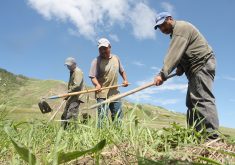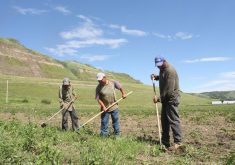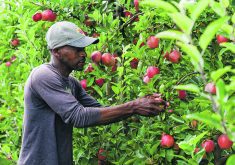In the world of work, business owners benefit from having employees and workers benefit from having a job.
In an ideal world, both sides should benefit equally.
When it comes to temporary foreign workers employed in agriculture, many Canadians say farmers are getting the better end of the deal.
Fifty-five percent of Canadians believe farmers benefit more from temporary foreign worker programs. While only 28 percent think the foreign workers get the most benefits from the programs, based on the results of a Nanos poll of 1,038 Canadians this fall.
Read Also

Fuel rebate rule change will affect taxes and AgriStability
The federal government recently announced updates to the fuel rebates that farmers have been receiving since 2019-20.
Senator Robert Black and Senator Ratna Omidvar commissioned the poll, to gauge public perceptions of temporary foreign workers.
“We pride ourselves in (our) safe food. And it’s these workers who are contributing to that safe Canadian food status,” Black said from his office in Ottawa.
The survey found that Canadians are supportive of the Temporary Foreign Worker Program and the Seasonal Agricultural Worker Program (for citizens of Mexico and Caribbean nations).
About 84 percent said the foreign workers have a positive or somewhat positive impact on Canada’s ag sector. Broken down by region:
• Quebec — 92 percent said positive or somewhat positive
• Ontario — 85 percent
• Prairies _ 78 percent
• BC — 76 percent
The public also believes temporary foreign workers should have the opportunity to become Canadian citizens or permanent residents. Eighty one percent support or somewhat support a “pathway” to remain in Canada.
“It’s just suggesting those that do want to stay, there needs to be opportunities or pathways to permanent residency,” Black explained.
Providing such an opportunity doesn’t mean that most foreign workers want to become Canadians and they’re being denied that opportunity.
Many of the migrants, from Mexico, Central America, the Philippines and elsewhere, like the temporary arrangement.
“(They’re) here for six to eight months and then go home to their families for four (months),” Black said. “They’ve been doing that for years.”
That’s the norm in Canada’s beekeeping industry, which employs hundreds of foreign workers.
Simon Lalonde, a beekeeper in Clavet, Sask., employs workers from Nicaragua. He’s been using foreign help for nearly two decades and some of his workers have returned to his apiary for five, six or nine years in a row.
Still, some temporary foreign workers may want to remain in Canada and the government should provide an opening for that group, Black said.
In May, the federal government launched a pilot project to accomplish a similar goal — for ag businesses that need people for year-round jobs.
The three-year project is designed to help meat processors, mushroom, greenhouse producers and livestock producers, recruit and retain full-time employees.
“It will provide a pathway to permanent residence for many temporary foreign workers,” the feds said in May. “A total of 2,750 applications will be accepted annually throughout the pilot, which applies primarily to people who are already in Canada.”
Contact robert.arnason@producer.com
















